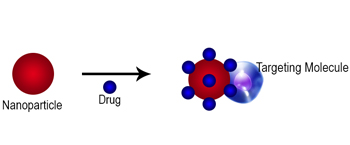
What is Targeted Drug Delivery?
Targeted drug delivery is an advanced system of delivering drugs to patients in a manner that enhances the concentration of said drug only at the body part of interest; for example, the cells, tissues, or organs. This in turn increases the effectiveness of treatment by decreasing side effects and ensuring that only the needed drug amount is delivered. This helps to maintain plasma and tissue drug levels in the body, thereby averting any damage to healthy tissue.
Types of Targeted Drug Delivery Carriers
Drug targeting can be achieved using different types of carriers that transport the drug to a specific tissue or organ. These drug-targeting carriers include:
- Nanotubes and nanowires
- Nanoshells
- Nanogels
- Quantum dots
- Nanopores
- Gold nanoparticles
- Dendrimers
- Niosomes
- Ufasomes
- Virosomes
- Cubosomes
- Nanobots
- Transferosomes
Indications for Targeted Drug Delivery
Targeted drug delivery has been deemed a powerful tool for the treatment of cancer because of its ability to deliver drugs and genes to tumour sites with protection from the extracellular environment. Targeted drug delivery via carriers such as stimuli-responsive nanogels (NGs) have been widely examined as smart drug delivery carriers for a variety of anticancer drugs, as well as genes, because of their ease of synthesis, stability, easy functionalization, and good control over particle size. The main objective of the targeted drug delivery system is to accomplish the pharmacological action of the therapeutic agent at diseased tissues/organs only, without impacting healthy tissue - particularly in cases of cancer treatment using chemotherapeutic agents.
Mechanisms of Targeted Drug Delivery
There are different mechanisms involved in targeted drug delivery systems such as:
- Passive targeting: This refers to the accumulation of a drug or drug carrier system at a specific site. The drugs are targeted to systemic circulation. Examples include targeting of antimalarial drugs for the treatment of candidiasis, brucellosis, and leishmaniasis.
- Inverse targeting: This approach involves saturation of the reticuloendothelial system (RES) and suppression of the defence mechanism by pre-injecting a large quantity of blank colloidal carriers. This is an effective method for non-RES organs.
- Active targeting: Active targeting refers to a specific ligand-receptor type interaction for intracellular localization which occurs only after blood circulation and extravasations. Active targeting can be further classified into:
- First-order targeting – This refers to restricted distribution of the drug carrier systems to the capillary bed of a predetermined target site, tissue, or organ, such as compartmental targeting in lymphatic, pleural cavity, peritoneal cavity, and joints.
- Second-order targeting – This refers to the selective delivery of drugs to specific cell types such as tumour cells and not normal cells, such as Kupffer cells in the liver.
- Third-order targeting – This refers to the selective delivery of drugs, particularly to the intracellular site of targeted cells.
- Dual targeting: In this mechanism, the carrier molecule itself has its own therapeutic activity and consequently increases the effect of the drug.
- Double targeting: In this type of mechanism, the spatial and temporal methodologies are combined to target a carrier system.
- Combination targeting: This is similar to double targeting in that the combination of targeting systems for the site-specific delivery of peptides and proteins is enabled with molecular specificity, but with direct access to the target site.
Benefits of Targeted Drug Delivery
The targeted drug delivery systems have numerous advantages over conventional ones such as:
- Convenience of administration
- Improvement of pharmaceutical activity
- Low side effects
- Smaller dose needed
- More accurate dosing
- Non-invasive
- High efficiency
- Higher compliance
- Economical






